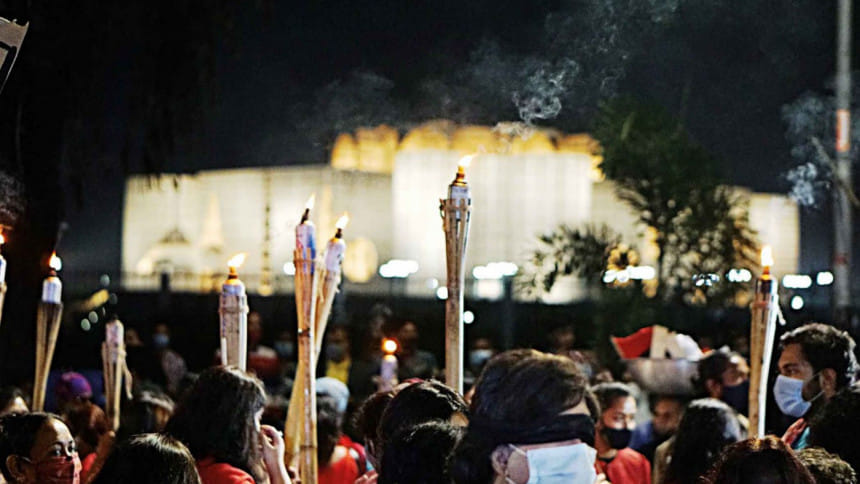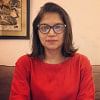Creating a ‘safer’ Bangladesh for women

Why is it so difficult to write about something that seems so obvious and urgent? Can it have something to do with that very "obviousness" itself? What if we were to switch codes for a second and change the title to "Creating a safer Bangladesh for men." How absurd does that sound? Almost everyone I presented this "alternate" title to either smiled or scoffed, regardless of their gender. Yet "Creating a safer Bangladesh for women" seems entirely apt; with an endless barrage of stories of violence in the media, it almost feels as if now is the worst time ever to be a woman. As much as I clearly appreciate such concerns, however, this underlying saviour-complex bothers me to no end. Are women an endangered species that need to be kept safe in a sanctuary? It is great that we are now having a conversation around women's safety, but how about we make it a conversation about equality instead?
Before we can talk about rights or equality, however, let us be cognisant of the fact that women are not one. There is no magic formula that can cater to the diversity of women's experiences, privileges and impediments that come with differences in class, ethnicity, religion, age and sexuality, and inclusivity has been a problem in both the "development" world as well as within the women's movement. Yet there is one thing that binds them all together as women: their second-class status in society. I may have a PhD, earn a considerable amount of money and raise a family, but I do not have equal rights as a man, either legally or socially. My constitution preserves my right to be a free and equal citizen, and yet after 50 years of independence, I am still on the streets fighting for equal rights, let alone the violence that is inflicted upon us 24/7. Is this the freedom that our parents and grandparents had fought for?
Let us not be distracted; you may call gender a "social construct," a "performance" (Butler, 1988), or indeed an elephant in the room—but the fact remains that there is deep and systemic gender inequality, learned and perpetuated from the level of the family to the state. Every social institution plays its part in sustaining this inequality and maintaining the status quo. We learn to hide, be invisible and be non-threatening, sheltering our body from birth to death. Our mission in life as a species seems to be to perpetually protect ourselves, even in our sleep; not to live like fully-evolved human beings. What a waste of energy!
Our "fragility"/"subservience" is not natural—it is a historical product. The Victorian morals of the metropoles permeated through the gendered class system in the colonies. Formal education and the introduction of a wage economy transformed agrarian gender relations, resulting in educated middle-class (mostly) men migrating to the urban centres, the rise of monogamy, and the nuclearisation of the family. Men emerged as the sole earners in their nuclear families, while women and children were reduced to being dependent "consuming units". As Bengal, along with the rest of British India, became increasingly swept up in anti-colonial, nationalist sentiments, the bhodrolok (educated middle class) iconised Indian women as the repositories of tradition—"modern and yet modest", a true representation of the newly "imagined nation" (Chatterjee, 2010). Both women and the nation thus had to be "rescued" from the coloniser. This construct also entered through the window into the Muslim Zenana mahal.
This gendered construct of women's subservience came to shape how Bangladesh as a nation was imagined. We put the nation's honour in women's wombs, calling them birangonas, while simultaneously immortalising the nation as mother, a sacrificial female figure in need of saving. Such idol-worshipping helped to feed a sensational nationalism, but had little to do with women's actual lives. Where do characters like freedom fighter Taramon Bibi, the nurses and field-doctors of 1971 like Fowzia Moslem, cultural and political activists like Nurjahan Murshid and Sufia Kamal, fit into these narratives? Where are the accounts of our mothers and grandmothers who held their families together and rebuilt this nation from scratch? They neither asked for our homage nor waited for a "knight in shining armour". It is time we take our pity-party for women elsewhere.
"The new woman" of Bangladesh was imagined by the women's rights activists to be truly independent economically and socially, having equal rights in every sphere of life. These activists helped to (re-)build the war-torn nation-state, helping with relief and rehabilitation while also pushing for new policies and laws that would ensure equal rights for women. The succeeding autocratic regimes coincided with the United Nations' "Decade for Women" (1975–85); these regimes upheld the liberal values promulgated under the UN's approach and sold "women's issues" to secure aid, while simultaneously using religion to legitimise their rule and as a weapon to deny women their rights in practice. Soon, a faction of the women's movement not only became critical of these regimes but played leading roles in mobilising against and overthrowing them altogether.
With the neoliberal turn and the expansion of the development sector in the 1980-90s, women's organisations had to register as NGOs to maintain their legal existence. While larger organisations like Bangladesh Mahila Parishad, Naripokhkho and Ain-o-Shalish Kendra managed to mobilise their resources and networks to pursue their own agendas, smaller NGOs succumbed and became service-delivery organisations that followed donors' mandates. This brought with it the saviour complex inherent in most donor agencies and international humanitarian organisations that essentialised people of colour as default "victims" (Chowdhury, 2011). The neoliberal discourse of "women empowerment" emanated from a similar premise, targeting individualised entitlements while disregarding the collective agency of women themselves. Whether we admit it or not, civil-society organisations allowed this language of "victimhood" to perpetuate, or were unable to resist it.
Yet despite having to battle the saviour complex of the state as well as development agencies, women have continued to pave their own paths, negotiating with various social forces in their everyday lives, individually as well as collectively, to bring about profound changes. Women have negotiated with their gender, generation, class, sexuality and kin while experiencing major economic-structural shifts. They have bargained with patriarchy across class-lines and recast the boundaries of the "private" and the "public". Despite domestic violence, rape, sexual harassment and countless other forms of trauma and stigma, women have persisted. Be it in agriculture, farming, garments, leather, education, civil service, development, as entrepreneurs or as migrant workers, women have thrived. As much as I would like to give some of the credit for this to the state, development agencies and civil society along with all those women who have been fighting for their rights, I am also hesitant precisely because of their "protectionist" attitudes.
After 50 years of independence, neither my comrades nor I expected to be demonstrating in front of the Press Club, Shaheed Minar and National Parliament demanding justice for Aurna, Tonu or Yasmin. This cannot be reduced to "women's issues" to make us look like perpetual victims. Why is this not a national issue? Why should oppressing half the population not result in all-out war, if that was the justified language or true "essence" of the Liberation War? Why does the very existence and visibility of women pose such a threat to society and "man"-kind? Perhaps that should be our question.
Even if we embrace neoliberal development as the paradigm for our individual and national aspirations, there is simply no way to ignore women's contributions. Neither the narrative of a developing Bangladesh nor the discourse of SDGs are complete without their poster girls: the school-going child, the garments worker, the happy farmer, the small/medium entrepreneur, and the migrant worker; add to that the countless hours women put in everyday as unpaid housework and social labour. It is clearly not women's fragility or subservience but their "empowered" selves that are sold in the neoliberal market. That is the face the state desires in/as a "medium-income country"—where then, is our share of this sale? My own research reveals that for urban middle-class families, it is impossible to survive without a dual income; this is even more true for the working classes. This means that whether our norms allow or not, everyone must get out and earn a living, regardless of their gender, just to survive. Safe or not, then, more and more women and transgender persons will be occupying public spaces; this is inevitable. The question is: is Bangladesh ready for it?
As much as we take pride in having a woman as Prime Minister and as Speaker of the Parliament, have we been able to translate such power and privilege to every woman in Bangladesh? Is it not a farce that we feel pride in women's achievements while depriving them of what is rightfully theirs—the very right to exist as they please? So, no, we as women will not ask for your benevolence nor pander for your protection. What I want is for every parent to raise their children as equals, to not shackle them, and to teach them to treat each other with respect. I want to see a nurturing society, dedicated to creating an enabling space for every individual to grow. I want a state that will put justice over party allegiance, and one that is unafraid to push for equal rights in property and entitlements for every citizen.
I do not think we are dealing with a complicated question here. We are demanding equality, which is our constitutional birthright. Individuals, families, society and the state need to "gear up" to make the readjustments necessary to enable women to achieve their full potentials. There is an indomitable force that is coming; they are coming in droves in saris and kameezes, hijabs and pants. Will Bangladesh feel safe once they start living their lives, or just be?
Seuty Sabur, PhD, teaches anthropology at the Department of Economics and Social Sciences, Brac University.

 For all latest news, follow The Daily Star's Google News channel.
For all latest news, follow The Daily Star's Google News channel. 



Comments